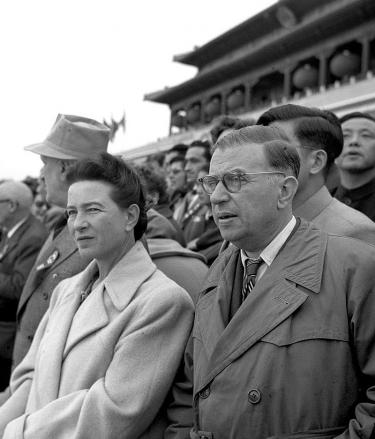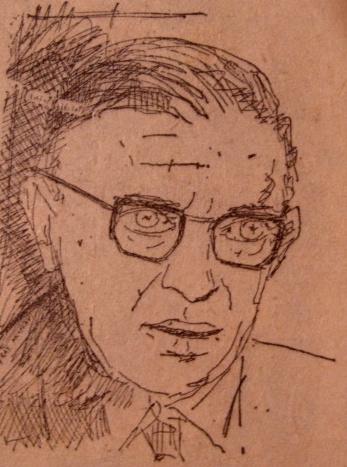People today are angry because they do not want to have discussions, encasing themselves in hell
The French existentialist philosopher and playwright John-Paul Sartre’s 1943 play “No Exit” (Huis Clos in French), contains one of the most celebrated lines in literary and philosophical history: “L’enfer, c’est les Autres.” “Hell is other people.”
I’ve heard a lot of people say that sort of thing over the years but Sartre, as an existentialist, meant something more.
The play is a narrative about three people who have been “sentenced” to hell: Garcin, Inez, and Estelle. A man and two women.
When they meet, they start fudging facts about their prior lives especially about the acts that brought them to hell. Also they are puzzled about what their punishment is supposed to be.
That is, there is no fire, no brimstone, no “official torturer” working the sinful crowd. All there is is the three of them locked in a drawing room bedecked with a hodge-podge of period furniture, seemingly for all eternity.
Because they shave the truth, they get short with each other; a negativity arises and their distrust strengthens.
We soon find out that Garcin died by a firing squad for deserting in war; Inez, a postal clerk, was gassed by her lover for seducing a friend’s wife; and the beautiful Estelle had an affair with a man whose love-child she drowned in front of him; he then took his own life.
Sartre says hell does not need Torquemada to satisfy justice. It exists when we present a “twisted, vitiated” self to others and this occurs once we’ve accepted twisted, vitiated values as the basis of our identity.
The vitiating twist begins when a person relies on the judgment of others to establish personal definition and self-worth, the polar opposite of those souls who strike out on their own in search of authenticity. Strike out not in a John Wayne individualism sort of way but in a way that involves self-responsibility and includes concern for the needs of others.
Sartre’s existentialism, therefore, is about choices, about making decisions to free ourselves from the imprisoning “gaze” of others, from being the object of another’s view, from a consciousness that projects an identity for us to assume. Often under pressure.
Inez, the existentialist among the trio, says accepting such an imprisoning mode of self-definition is the hell we endure because “It’s what one does ... that shows the stuff one’s made of.”
Sartre wants his readers to see that a person’s decisions toward freedom determine his essence; it does not work the other way around. The pudding’s proof is in action.
A person’s addiction to false-identity-status is highlighted in the play when the beautiful Estelle discovers there is no mirror in the room. She grows anxious and panicky — Sartre called this state of being “nausea” — because she cannot connect with a reality that will make her feel alive.
Pathetically she pines, “When I can’t see myself in the mirror, I can’t even feel myself, and I begin to wonder if I exist at all.”
This frame of mind Sartre calls “bad faith.” It manifests little or no concern for others. It follows the axiom: An inauthentic person’s values cannot extend beyond the prison that contains him.
I’m sure that someone coming from proverbial Mars who watches the news in America today and listens to political commentators from every side of the political aisle, would conclude that America is a living Sartrean hell, a hell of its own choosing.
And should our Martian look at things with an existentialist’s eye, he would see sectors of folks who agree to be locked in a “base” (of ire’s hue), amount to little more than an object projected from a politician’s consciousness, gaze, and critical assessment — not for the collective’s well-being but for his own.
Under any circumstances, it’s not possible to create an authentic self by mouthing a script; this is more true when the script requires a person to fit into a one-dimensional, homogenized reality.
Donald Trump’s base seems to fit such a description having turned into a postmodern version of Marx’s lumpenproletariat.
You can search Wikipedia for what they say about lumpenproles but today they’re described as stereotypical clowns, the kind you find in an absurdist comedy.
Robert Bussard, now a music librarian at Western Washington University, once examined the lumpenproletariat the way Marx and Engels first described it.
He said in “The ‘dangerous class’ of Marx and Engels: The rise of the idea of the Lumpenproletariat” in 1987 that lumpenproles act out of “ignorant self-interest.” They shoot themselves in the foot and call it progress.
Because they are subject to a version of self-victimization, Bussard says they are “easily bribed by reactionary forces ... to combat” those primed to meet the needs of others.
That is, the lumpenproletariat is a spoiler. It does not “play a positive role in society,” Bussard adds, “Instead, it exploit[s] society for its own ends, and [is] in turn exploited as a tool of destruction and reaction.”
I’m sure you know people like this. They yell, they shout, they think it’s possible to keep things the way they were before the current upheaval began. They’re John Wayne or a comedian playing to the weakest part of the soul.
In movies and on TV these days, hell is projected in a host of dystopian formats, the bastard offspring of George Orwell’s “1984” and Aldous Huxley’s “Brave New World.”
In such works — include Marge Piercy and Ursula Le Guin’s among them — every soul from the orchestra seats to the far mezzanine — is panicked for a way out. Like everybody else, they do not like hell and scan the walls for a breach they might squeeze through and breathe life.
All of which points to how difficult change is. It requires re-vision, re-configuring the way the eyes see by reconnecting them to the heart, that is, creating a political economy in which the needs of others count as much as our own.
I ask people all the time about the means they use to escape the unhappiness of their hell — pharmaceutically and otherwise. At first they’re stumped, they stumble over the words. They never thought through what it means to see others as they see themselves.
In the speech he gave in December 1980 upon receiving the Nobel Prize for literature, the Polish poet Czeslaw Milosz said that freeing one’s self from prison requires a special kind of vision, the kind poets have: double-vision.
Milosz said poets see close-up and face-to-face, but they also see from up above, in overview, not sequentially but simultaneously.
Milosz used Selma Lagerlöf’s “Wonderful Adventures of Nils,” to make his point. Like Nils, he said, the poet sees close up but he also “flies above the Earth and looks at it from above.” He sees it “in every detail” but also “beholds under him rivers, lakes, forests, that is, a map, both distant and yet concrete.”
This is not a therapy session so how to get such a vision needs to be discussed. It will take years.
Realizing this explains why so many people are angry today. They do not want to have this discussion, they deny its importance and, in doing so, encase themselves in hell, a base that feeds on despair.
This may be cause for hope because, as Sartre said in his 1943 play “The Flies” (Les Mouches in French), “Life begins on the other side of despair.”

